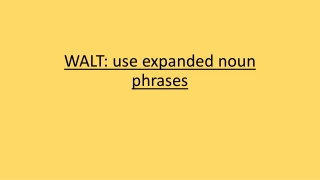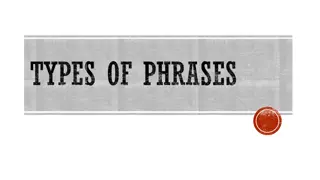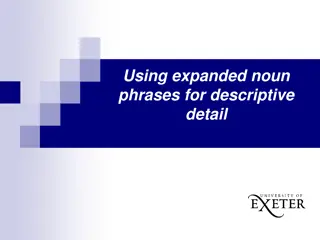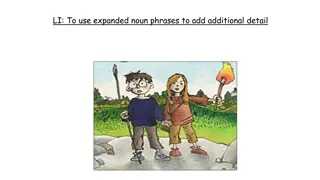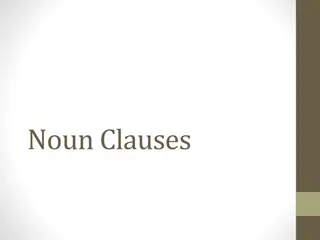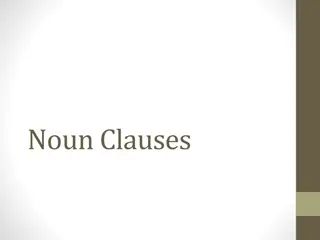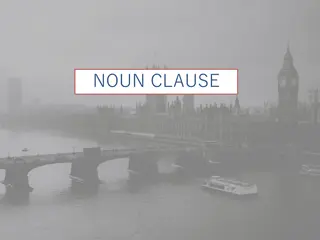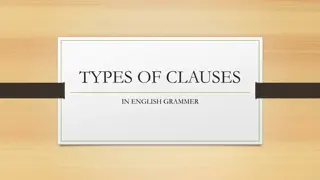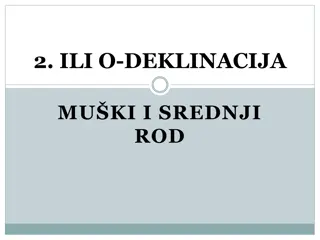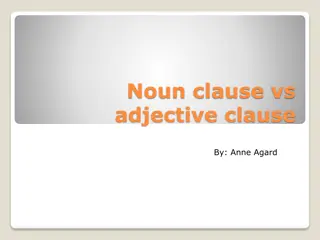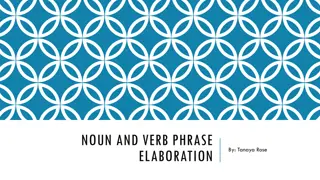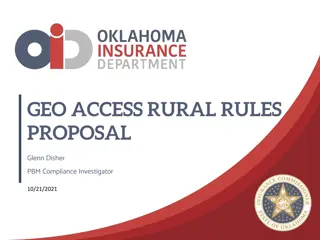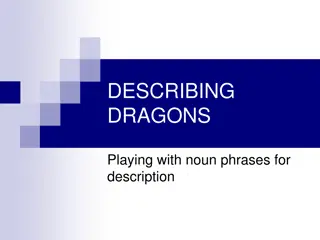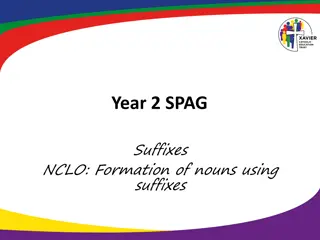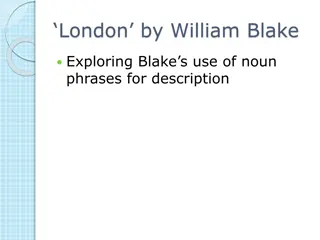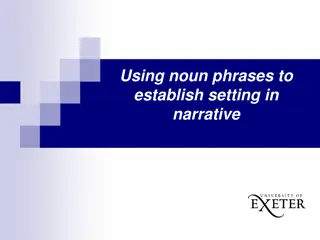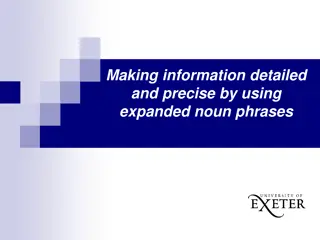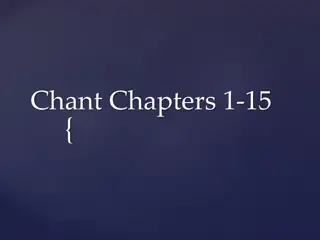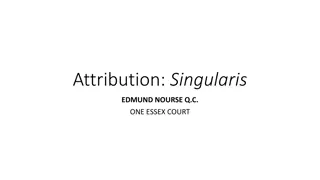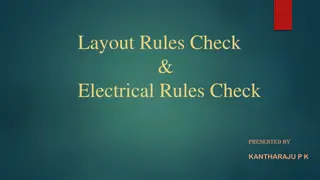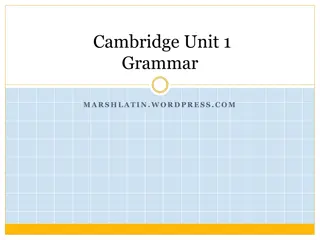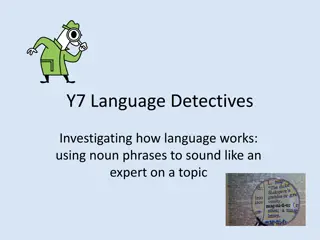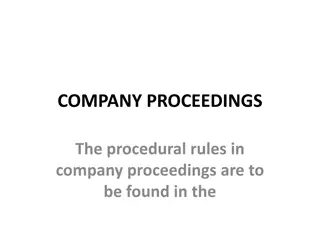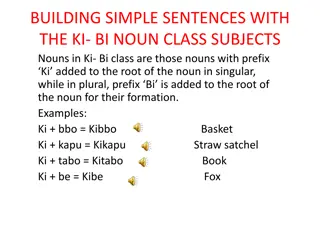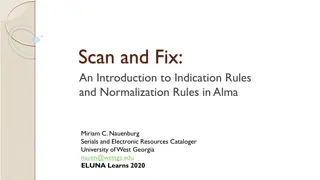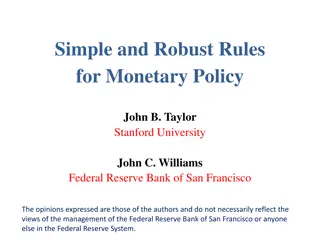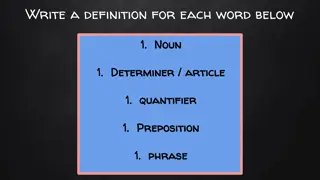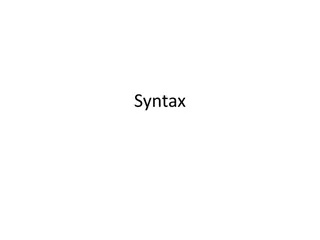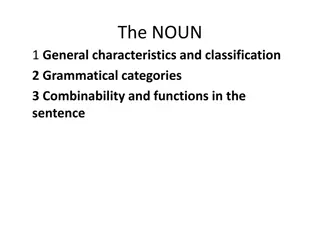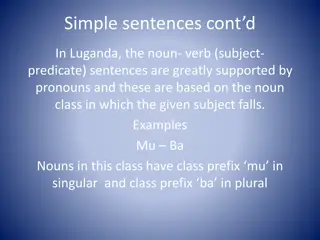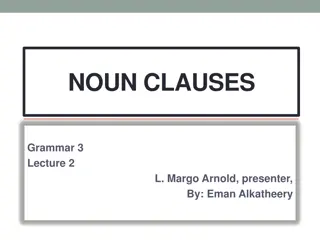WALT: use expanded noun phrases
Write expanded noun phrases using adjectives to describe Macbeth's appearance, characteristics, and surroundings. Enhance your writing skills with vivid details.
0 views • 5 slides
Understanding Different Types of Phrases in English Grammar
Explore the various types of phrases in English grammar, including noun phrases and adjectival phrases. Learn how modifiers can come before or after the noun in a phrase, and practice identifying these phrases in sentences. Enhance your understanding of grammar with clear examples and explanations.
1 views • 12 slides
Exploring Descriptive Detail Through Expanded Noun Phrases
Delve into the art of using expanded noun phrases for descriptive richness in writing, as showcased through authentic texts and engaging discussions. Uncover how these linguistic choices bring life to descriptions, enhance imagery, and spark creativity in readers' minds.
0 views • 6 slides
Enhancing Descriptions with Expanded Noun Phrases
Learn how to transform simple noun phrases into detailed descriptions by adding adjectives to create expanded noun phrases. Explore examples and engage in an activity to practice using expanded noun phrases to describe characters effectively.
0 views • 6 slides
Understanding Noun Clauses: Examples and Usage
A clause is a group of words with a subject and a verb, while a phrase lacks a subject and verb. Noun clauses, which function as nouns, can be subjects, objects of verbs or prepositions, and complements. They often begin with question words like what, when, or why. Examples illustrate their usage in
2 views • 49 slides
Understanding Noun Clauses in English Grammar
A clause is a group of words with a subject and a verb, while a phrase lacks one. Independent clauses can stand alone, while dependent clauses cannot. Noun clauses function as nouns in a sentence, serving different roles like subjects, objects, prepositional objects, and complements. They can start
1 views • 49 slides
Understanding Adjectivals in Noun Phrases: A Comprehensive Guide
Adjectivals, including determiners, adjectives, and nouns, play crucial roles in modifying nouns within noun phrases. This guide explores the different types of adjectivals, their positions within a phrase, the use of pre-headword modifiers such as determiners, and the order of adjectives and nouns.
1 views • 40 slides
Understanding Noun Clauses in English Grammar
A clause is a group of words with a subject and verb, while a phrase lacks one. Noun clauses, functioning as nouns, serve various roles in sentences. They can be subjects, objects of verbs/prepositions, or complements. Starting with question words like what, when, or why, these clauses mirror statem
0 views • 49 slides
Understanding Noun Clauses and Their Functions
A clause is a group of words containing a subject and predicate forming part of a sentence. Noun clauses act as nouns in a sentence and can function in various ways, such as being the subject or object of a verb, participle, or preposition. They are identified by asking "who" or "what" questions and
0 views • 23 slides
Present Perfect for Giving News: Verb-Noun Collocations and Usage
Study materials on using the Present Perfect tense for sharing news with just, yet, and already. Practice exercises in verb-noun collocations and identifying incorrect words. Explore examples of news messages and answer related questions. Learn how to express events that are connected to the present
1 views • 5 slides
Understanding Types of Clauses in English Grammar
A clause is a fundamental unit of a sentence, comprising a subject and predicate. Learning about the different types of clauses - Independent, Dependent, Relative, and Noun clauses - helps in enhancing grammar skills and sentence structure understanding. Independent clauses stand alone as complete s
2 views • 11 slides
Noun Declensions in Latin - Rules and Examples
Explore the declensions of nouns in Latin for the second declension, including masculine and neuter genders. Learn about the endings for singular and plural forms, along with specific rules for each gender. Dive into the differences between masculine and neuter noun declensions with detailed explana
0 views • 7 slides
Understanding Adjective Clauses and Noun Clauses in English Grammar
Learn the key differences between adjective clauses and noun clauses in English grammar. Adjective clauses describe nouns, while noun clauses take the place of a noun in a sentence, serving as either the subject or object of a verb. Discover how to identify and use these clauses effectively through
0 views • 10 slides
Financial and Eligibility Rules for EU Cooperation Programmes
Financial and eligibility rules for EU cooperation programmes include details on the first-level control unit, sources of information, hierarchy of rules, overarching eligibility rules, and reporting overview. These rules cover areas such as project activities, expenditure eligibility, procurement r
2 views • 27 slides
Understanding Grammatical Development in Speech-Language Pathology
Explore a broader perspective of grammatical development in speech-language pathology focusing on noun and verb phrase elaboration. Learn about identifying and elaborating noun phrases, substitution tests, and the elements of an elaborated noun phrase. Gain insights into clinical approaches and lang
0 views • 28 slides
Rural Access Compliance Rules Proposal by Glenn Disher - PBM Investigator
Proposal by Glenn Disher, a PBM Compliance Investigator, outlines rules for rural access compliance. The proposal focuses on considering local conditions and enforcing rules for maximum impact. It includes recommendations for zip code rules, compliance mileage rules, and examples of non-compliant ru
0 views • 7 slides
Mastering Noun Phrases for Vivid Descriptions
Explore the art of crafting compelling noun phrases to vividly describe dragons and other fantastical creatures. Learn techniques such as using determiners, hyphenated adjectives, prepositional phrases, similes, and relative pronouns to create imaginative and detailed descriptions. Elevate your writ
0 views • 15 slides
Exploring Noun Formation with Suffixes - Year 2 SPAG Activities
Dive into the world of noun formation using suffixes in this engaging Year 2 SPAG lesson. Discover how suffixes transform verbs into nouns, identify job titles by adding the suffix "-er" to action words, understand emotions through "-ment" suffixes, and recognize qualities with "-ness" endings. Enga
0 views • 10 slides
Analysis of William Blake's Use of Noun Phrases in "London
Exploring William Blake's poem "London," this analysis focuses on the use of noun phrases to describe people, places, objects, and emotions. By examining the nouns chosen by Blake and the patterns they form, we gain insight into the vivid and evocative imagery he creates. The expanded noun phrases i
1 views • 4 slides
Exploring Setting Through Noun Phrases in Narrative Descriptions
Establishing setting in narrative through the use of descriptive noun phrases is crucial for creating a vivid and immersive atmosphere. By carefully selecting and arranging nouns, authors can evoke specific moods and engage readers in a detailed visual experience. This approach enhances the overall
1 views • 6 slides
Enhancing Writing Through Detailed Noun Phrases
Explore the LEAD principles for connecting grammar with meaning and rhetorical effect in writing. Authentic texts are utilized to engage learners in deep metalinguistic learning. An interactive activity challenges readers to match descriptions with marine creatures based on detailed noun phrases. De
1 views • 6 slides
Vocabulary Practice: Context Clues and Noun Forms
Enhance your vocabulary skills with this practice set. Learn to determine word meanings through context clues and identify correct noun forms. Sharpen your language understanding by solving exercises on various words and their meanings in different contexts.
0 views • 25 slides
Vocabulary Lesson on Actions and Nouns
Explore various action words and corresponding noun forms in this vocabulary lesson. Learn about verbs like groom, share, and flap, along with their noun counterparts such as calf, cushion, and claw. Expand your understanding of language by discovering how animals and humans use these words in every
0 views • 24 slides
Greek Language Verb Forms and Noun Declensions Overview
Explore verb forms and noun declensions in the Greek language through detailed images and descriptions. Learn about present active and middle/passive indicative verbs, shape of the future, imperfect active paradigm, and more. Practice pronouns and delve into the structure of the Greek language effor
0 views • 24 slides
Understanding Company Attribution Rules in Legal Proceedings
Company attribution rules in legal proceedings are outlined, focusing on primary rules found in a company's constitution, general principles of agency, and exceptions where traditional attribution methods may not apply. The interpretation of laws involving companies and the application of specific a
0 views • 7 slides
English Grammar Final Exam Review
Subordinate clauses, nominal phrases, and noun clauses are identified within the context of adjectival, adverbial, or nominal functions. The exercise covers recognizing nominal clauses following prepositions as noun phrases, pronouns, gerunds, or nominal clauses. Additionally, combining sentences us
0 views • 17 slides
Layout and Electrical Rules Check by KANTHARAJU P.K.
Layout rules check is essential in preparing masks for fabrication processes to ensure accuracy. Key design rules include minimum width, spacing, enclosure, and extension. Electrical rules checking (ERC) methodology is used to verify design robustness against electronic design rules at schematic and
0 views • 15 slides
Understanding Greek Noun Inflection and Cases
Explore the intricacies of Greek noun inflection, including cases like nominative, subjective, genitive, possessive, dative, and accusative. Learn about lexical forms, gender, number, and how to identify cases in Greek nouns. Dive into examples from John 3:16 and Mark 2:2 to see these concepts in ac
0 views • 36 slides
Understanding Latin Noun Cases and Declensions
Explore the use and distinctions of Latin noun cases (Nominative, Genitive, Dative, Accusative, Ablative), along with the concept of declensions, genders, numbers, and cases. Learn how to determine the declension, gender, number, and case of a Latin noun through its endings, and delve into examples
0 views • 23 slides
Mastering Noun Phrases for Expertise in Language
Explore the power of crafting precise noun phrases to elevate your expertise on any topic. Unveil the secrets of using nouns strategically to convey depth and authority in your writing. Dive into the world of language detectives and uncover the nuances of language through the lens of noun phrases. E
0 views • 10 slides
Understanding Procedural Rules in Company Proceedings
Procedural rules governing company proceedings can be found in the Companies Proceeding Rules, Companies Winding-Up Rules, and the Federal High Court (Civil Procedure) Rules. These rules dictate the process for applications, such as Originating Summons, Originating Motion, or Petition under CAMA. Th
0 views • 22 slides
Constructing Sentences with Ki-Bi Noun Class
Learn how to form simple sentences using nouns in the Ki-Bi class. Discover how to create plural nouns and construct subject-predicate sentences with the appropriate prefixes. Explore examples and rules for transforming singular nouns into plural forms. Master the use of Ki and Bi prefixes for effec
0 views • 5 slides
Scan and Fix: Indication and Normalization Rules in Alma
Introduction to indication rules and normalization rules in Alma Miriam C. Nauenburg's presentation on the scan and fix workflow. Learn about creating and applying indication and normalization rules, testing rules in the Metadata Editor, and organizing rules as private or shared.
0 views • 54 slides
Understanding Word Classes and Noun Functions in Grammar
Explore the concept of word classes such as open class and minimum free form, structural vs traditional grammar, count abstract vs concrete nouns, noun phrase extensions, properties of nouns, and noun functions in language. Enhance your understanding of adjectives, determiners, prepositions, and var
0 views • 28 slides
Simple and Robust Rules for Monetary Policy Overview
This document discusses the historical background, empirical experience, characteristics of simple rules, robustness, and the comparison between optimal control and simple rules in monetary policy. It explores the evolution of policy rules from Smith and Ricardo to modern approaches, emphasizing the
0 views • 22 slides
Understanding Noun Phrases: Definitions and Examples
Noun phrases are essential components of language that consist of a noun and other words that describe or modify it. This article provides definitions for key terms related to noun phrases, such as nouns, determiners, quantifiers, prepositions, adjectives, and adverbs. Examples and images help illus
0 views • 12 slides
Understanding Syntax in Linguistics
Words in a language are organized into phrases and clauses with specific syntactic categories like Noun Phrase, Verb Phrase, and Adjective Phrase. Each phrase has a head such as a noun, verb, or adjective, and phrase structure rules help diagram the syntactic structure. Clauses are the largest units
0 views • 20 slides
Understanding the Noun: Characteristics, Classification, and Functions
The noun is a fundamental part of speech expressing various concepts such as names of objects, living beings, places, materials, processes, and more. It is characterized by semantic features, formal criteria including derivational features, grammatical categories like number and gender, and combinab
0 views • 18 slides
Luganda Noun-Verb Sentences and Pronouns
Explore Luganda noun-verb sentence structures supported by pronouns based on noun classes, specifically Mu-Ba and Mu-Mi, with examples showcasing singular and plural forms. Learn how to construct simple sentences using various nouns in these classes.
0 views • 6 slides
Understanding Noun Clauses in Grammar
Noun clauses are dependent clauses that act as nouns in sentences, serving as subjects, verb objects, prepositional objects, and complements. They should not be separated from main clauses with punctuation. Noun clauses can appear at the beginning of a sentence or after certain nouns, adjectives, an
0 views • 77 slides
